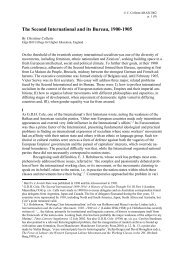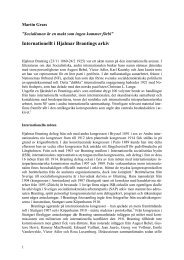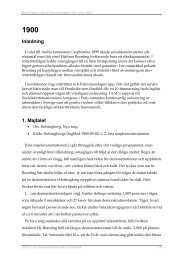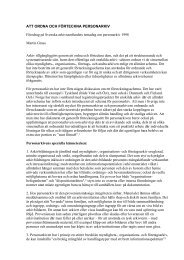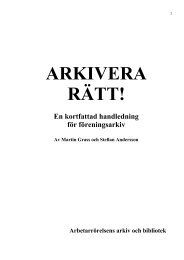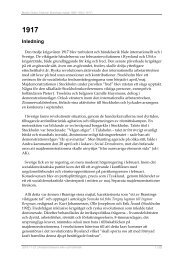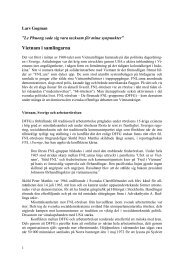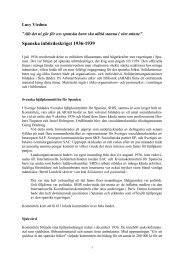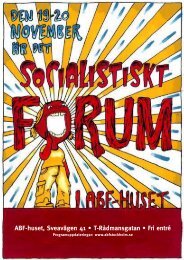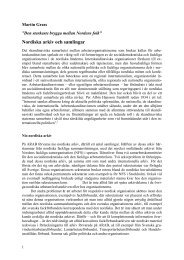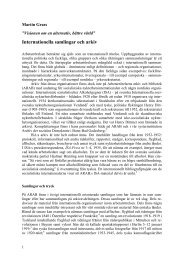Communism, Social Democracy and the Democracy Gap
Communism, Social Democracy and the Democracy Gap
Communism, Social Democracy and the Democracy Gap
Create successful ePaper yourself
Turn your PDF publications into a flip-book with our unique Google optimized e-Paper software.
© S. Berger/ARAB 2002<br />
p. 8 (14)<br />
control, socialisation <strong>and</strong> workers' self-management were particularly prominent among<br />
left-wing socialists who refused to commit <strong>the</strong>mselves ei<strong>the</strong>r to <strong>the</strong> reformism of <strong>Social</strong><br />
<strong>Democracy</strong> or <strong>the</strong> undemocratic antics of <strong>the</strong> Communists.<br />
Particular emphasis was often put on <strong>the</strong> democratisation of <strong>the</strong> economic sphere.<br />
Calls for economic democracy became popular in <strong>the</strong> inter-war period <strong>and</strong> were adopted<br />
even by many <strong>Social</strong> Democratic parties in <strong>the</strong> inter-war period. In Germany, <strong>the</strong> idea was<br />
developed by Fritz Naphtali, <strong>the</strong> head of <strong>the</strong> ADGB's Research Institute for Economic<br />
Affairs between 1925 <strong>and</strong> 1928. The democratisation of <strong>the</strong> economic sphere was to be<br />
achieved through extending <strong>the</strong> powers of works councils <strong>and</strong> establishing institutions for<br />
economic self-administration in which unions would be represented on equal terms with<br />
<strong>the</strong> employers. While <strong>the</strong> first steps towards 'economic democracy' could already be<br />
achieved under capitalism (essentially through state intervention in central processes of<br />
economic decision-making), full 'economic democracy', Naphtali insisted, would only be<br />
possible in a socialist economy. Hence <strong>the</strong> transformation of capitalism <strong>and</strong> <strong>the</strong> abolition<br />
of <strong>the</strong> private ownership of <strong>the</strong> means of production remained <strong>the</strong> long-term aim of <strong>the</strong><br />
ADGB. 33 The Dutch SDAP also dem<strong>and</strong>ed a significant improvement in worker<br />
participation in management at <strong>the</strong> end of <strong>the</strong> First World War. 34 Whitley councils in<br />
Britain after 1918 as well as <strong>the</strong> Mond-Turner talks in <strong>the</strong> late 1920s signalled an interest<br />
in economic democracy among sections of <strong>the</strong> British labour movement as did <strong>the</strong> more<br />
<strong>the</strong>oretical contributions of Webb, Cole <strong>and</strong> Harold Laski. 35 In France, Jaurès had already<br />
argued that <strong>the</strong> political democracy of <strong>the</strong> republic had to be extended to <strong>the</strong> whole of <strong>the</strong><br />
country's economic life. 36<br />
Yet, despite <strong>the</strong> popularity of dem<strong>and</strong>s for economic democracy even among<br />
mainstream <strong>Social</strong> Democrats, it is among groups of left-wing <strong>Social</strong> Democrats,<br />
independent socialists, guild socialists, anarcho-syndicalists <strong>and</strong> unorthodox Communists<br />
that we find most concern for <strong>the</strong> fostering of a democratic civil society in <strong>the</strong> inter-war<br />
period. Statism of <strong>the</strong> Communist or <strong>Social</strong> Democratic variant, <strong>the</strong>y argued, neglected <strong>the</strong><br />
problem of social power <strong>and</strong> did not actively seek to empower working people in <strong>the</strong>ir<br />
everyday lives. People had to practice democracy on a daily basis ra<strong>the</strong>r than delegate<br />
responsibility for decision-making to elected representatives or a party vanguard. They<br />
had to be encouraged to take control of <strong>the</strong>ir lives in a more direct way. Localised direct<br />
democracies in which <strong>the</strong> people could realise democracy in all spheres of life were to be<br />
preferred to <strong>the</strong> deadening weight of heavily bureaucratised parties, trade unions <strong>and</strong><br />
states. Rosa Luxemburg's opposition to Leninism was rooted, above all, in different ideas<br />
about <strong>the</strong> democratic organisation of society.<br />
In <strong>the</strong> post-Second World War period many of <strong>the</strong>se concerns surfaced again with<br />
<strong>the</strong> post-1956 emergence of <strong>the</strong> first New Left, with <strong>the</strong> advances of <strong>the</strong> student movement<br />
in <strong>the</strong> 1960s, with second-wave feminism, with <strong>the</strong> growth of green/ecological movements<br />
in <strong>the</strong> 1970s <strong>and</strong> with <strong>the</strong> revival of notions of active citizenship in communitarian thought<br />
in <strong>the</strong> 1980s <strong>and</strong> 1990s. 1956 brought various attempts in Eastern Europe to democratise<br />
<strong>the</strong> Stalinised people's democracies. Reforms went fur<strong>the</strong>st in Pol<strong>and</strong> <strong>and</strong> Hungary <strong>and</strong><br />
included economic, cultural <strong>and</strong> political liberalisation as well as experiments with<br />
grassroots democracy which eventually resulted in <strong>the</strong> declaration of a multi-party state in<br />
33 John Moses, 'The Concept of Economic <strong>Democracy</strong> within <strong>the</strong> German <strong>Social</strong>ist Trade Unions during <strong>the</strong><br />
Weimar Republic', Labor History 34 (1978), pp. 45-57.<br />
34 Lex Heerma van Voss, 'The Ne<strong>the</strong>rl<strong>and</strong>s', in: Berger <strong>and</strong> Broughton (eds), Force, p. 50.<br />
35 Jutta Rabenschlag-Kräußlich, Parität statt Klassenkampf Zur Organisation des Arbeitsmarkts und<br />
Domestizierung des Arbeitskampfs in Deutschl<strong>and</strong> und Engl<strong>and</strong> 1900-1918 (Frankfurt am Main 1983); Michael<br />
Dintenfass, 'The Politics of Producers' Co-operation: <strong>the</strong> FBI-TUC-NCEO Talks 1929-1933', in: John Turner<br />
(ed.), Businessmen <strong>and</strong> Politics: Studies of Business Activity in British Politics, 1900-1945 (London 1984).<br />
36 Kołakowski, Currents, vol. 2, p. 130.



